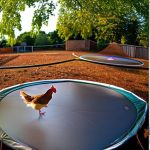Keeping chickens in Ontario has become increasingly popular in recent years. Many people are drawn to the idea of having fresh eggs and the opportunity to connect with nature right in their own backyard. However, before diving into the world of backyard chicken keeping, it’s important to understand the regulations that are in place to ensure the health and safety of both the chickens and the community.
Key Takeaways
- Ontario has regulations on keeping chickens that must be followed
- Keeping chickens in Ontario can provide benefits such as fresh eggs and natural pest control
- There are specific types of chicken coops allowed in Ontario
- Minimum requirements for chicken coops in Ontario include proper ventilation and predator protection
- Constructing a chicken coop that meets Ontario’s regulations requires attention to detail and proper planning
Understanding Ontario’s regulations on keeping chickens
In Ontario, there are regulations in place for keeping chickens. These regulations vary depending on the municipality, so it’s important to check with your local government before starting a backyard flock. The purpose of these regulations is to ensure that chickens are kept in a safe and sanitary environment, and that they do not pose a nuisance to neighbors or the community.
Benefits of keeping chickens in Ontario
There are many benefits to keeping chickens in Ontario. One of the most obvious benefits is having a constant supply of fresh eggs. Not only are these eggs delicious, but they also tend to be more nutritious than store-bought eggs. In addition to eggs, chickens also provide valuable fertilizer for gardens. Their droppings can be composted and used to enrich the soil, resulting in healthier plants and higher yields.
Keeping chickens can also be a fun and educational experience for families. Children can learn about responsibility by helping to care for the chickens, and they can also learn about where their food comes from. Chickens are fascinating creatures with unique personalities, and watching them interact can be both entertaining and educational.
Types of chicken coops allowed in Ontario
There are different types of chicken coops allowed in Ontario, depending on the municipality and the size of the property. Stationary coops are the most common type, and they are typically made of wood or metal. These coops provide a secure and comfortable environment for the chickens, with nesting boxes for laying eggs and roosting bars for sleeping.
Mobile coops, also known as chicken tractors, are another option. These coops are designed to be moved around the yard, allowing the chickens to graze on fresh grass and insects. Mobile coops are a great option for those who want to give their chickens access to fresh forage while still keeping them contained.
Minimum requirements for chicken coops in Ontario
There are minimum requirements for chicken coops in Ontario to ensure the health and safety of the chickens. These requirements may vary depending on the municipality, but some common guidelines include:
– Size: The coop should be large enough to comfortably accommodate the number of chickens you plan to keep. As a general rule of thumb, each chicken should have at least 4 square feet of indoor space and 10 square feet of outdoor space.
– Ventilation: The coop should have adequate ventilation to prevent the buildup of moisture and ammonia. This can be achieved through windows, vents, or other openings.
– Predator protection: The coop should be secure and predator-proof, with sturdy walls and a roof that can withstand attempts by predators to gain access.
– Nesting boxes: The coop should have nesting boxes where the chickens can lay their eggs. These boxes should be clean, dry, and easily accessible for egg collection.
How to construct a chicken coop that meets Ontario’s regulations

If you’re planning to construct a chicken coop that meets Ontario’s regulations, there are a few things to keep in mind. First, choose appropriate materials that are durable and easy to clean. Wood is a popular choice for coop construction, but it should be treated or painted to protect against rot and pests.
Proper ventilation is also important. Make sure there are windows or vents that can be opened and closed as needed to regulate temperature and airflow. It’s also a good idea to install wire mesh over any openings to prevent predators from gaining access.
There are resources available to help with the construction of a chicken coop that meets Ontario’s regulations. Online guides and workshops can provide step-by-step instructions and tips for building a coop that is safe, comfortable, and compliant with local regulations.
Permits required for keeping chickens in Ontario
In some municipalities, permits may be required for keeping chickens in Ontario. These permits are typically obtained from the local government and may involve an application process and a fee. It’s important to check with your local government before starting a backyard flock to ensure that you are in compliance with any permit requirements.
Rules on the number of chickens allowed per property in Ontario
The rules on the number of chickens allowed per property in Ontario can vary depending on the municipality. Some municipalities have specific limits on the number of chickens allowed, while others may have restrictions based on the size of the property or the distance between the coop and neighboring properties.
It’s important to follow these rules to avoid any legal issues. Keeping more chickens than allowed can result in fines or other penalties, so it’s best to check with your local government to determine the specific rules for your area.
Health and safety considerations for keeping chickens in Ontario
There are several health and safety considerations to keep in mind when keeping chickens in Ontario. Proper hygiene is essential to prevent the spread of disease. This includes regularly cleaning the coop, providing clean bedding, and practicing good hand hygiene when handling the chickens or their eggs.
It’s also important to be aware of common chicken diseases and take steps to prevent them. This can include vaccinating the chickens, practicing biosecurity measures, and monitoring for signs of illness.
Is keeping chickens in Ontario right for you?
Keeping chickens in Ontario can be a rewarding experience, but it’s important to consider whether it’s right for you based on your personal circumstances and willingness to follow regulations and guidelines. Before starting a backyard flock, take the time to research and understand the regulations in your municipality, and make sure you have the time, resources, and commitment to properly care for the chickens.
If you decide that keeping chickens is right for you, take the necessary steps to ensure that your coop meets Ontario’s regulations and that you are in compliance with any permit requirements. By doing so, you can enjoy the many benefits of keeping chickens while also ensuring the health and safety of both the chickens and your community.
If you’re interested in keeping chickens in Ontario, you may also want to check out this informative article on The Chicken Coop Country Diner. It provides valuable insights into creating a comfortable and functional space for your feathered friends. From choosing the right coop design to understanding the importance of proper ventilation and lighting, this article covers all the essentials for a successful chicken-keeping experience. So, if you’re looking to create a cozy home for your chickens, be sure to give it a read! (source)
FAQs
What are the rules and regulations for keeping chickens in Ontario?
In Ontario, the rules and regulations for keeping chickens vary depending on the municipality. It is important to check with your local government to find out what rules apply to your area.
Do I need a permit to keep chickens in Ontario?
Again, this depends on the municipality. Some areas require a permit to keep chickens, while others do not. It is important to check with your local government to find out what rules apply to your area.
How many chickens am I allowed to keep in Ontario?
The number of chickens you are allowed to keep in Ontario varies depending on the municipality. Some areas have a limit on the number of chickens you can keep, while others do not. It is important to check with your local government to find out what rules apply to your area.
What are the requirements for keeping chickens in Ontario?
The requirements for keeping chickens in Ontario vary depending on the municipality. Some areas have specific requirements for coop size, fencing, and other factors. It is important to check with your local government to find out what rules apply to your area.
Can I keep roosters in Ontario?
Some municipalities in Ontario allow roosters, while others do not. It is important to check with your local government to find out what rules apply to your area.
What are the benefits of keeping chickens in Ontario?
Keeping chickens in Ontario can provide a source of fresh eggs, as well as fertilizer for gardens. Chickens can also be enjoyable pets and can help control pests in the yard.
Meet Walter, the feathered-friend fanatic of Florida! Nestled in the sunshine state, Walter struts through life with his feathered companions, clucking his way to happiness. With a coop that’s fancier than a five-star hotel, he’s the Don Juan of the chicken world. When he’s not teaching his hens to do the cha-cha, you’ll find him in a heated debate with his prized rooster, Sir Clucks-a-Lot. Walter’s poultry passion is no yolk; he’s the sunny-side-up guy you never knew you needed in your flock of friends!







